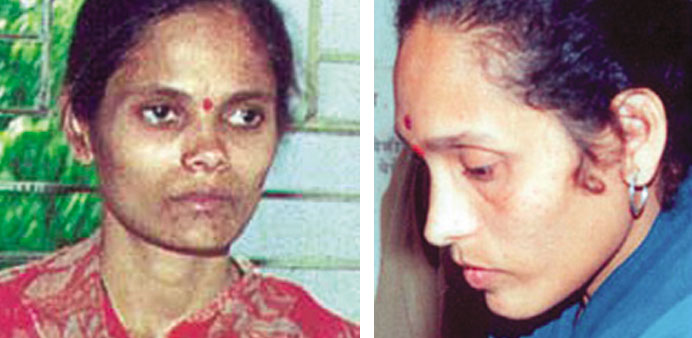Seema Gavit (left) and Renuka Shinde.
Agencies/Mumbai
Two half-sisters saw their execution for kidnapping and murdering children stayed, as a court agreed to consider their plea to have the sentences commuted, a news report said yesterday.
The convicts say the 13-year delay in carrying out the sentences was excessive, and have requested that they be commuted to life in prison, The Hindu reported online.
Renuka Shinde,45 and Semma Gavit,39 from Kolhapur, in Maharashtra, were convicted in 1996 of abducting 13 children, and killing five. The prosecution said they ran a begging ring.
The Bombay High Court and the Supreme Court have both upheld the sentence.
Last month President Pranab Mukherjee, who has the power to commute a death sentence, rejected their appeal
The Mumbai court’s decision on Wednesday to accept the plea also allowed the intervention of Majlis, a women’s rights organisation that has opposed the sentence.
The state and national authorities were given two weeks to respond, and the next hearing set for September 9, the report said.
It was 1990 when the two sisters, then just teenagers, abducted their first victim. They were daughters of a woman who made a career out of picking pockets in crowded markets and railway stations in Maharashtra. And their family had just come apart.
According to a 2006 Telegraph report, their parents had split and their father had married another woman and had a child. Under their mother’s direction, Shinde and Gavit kidnapped their half-sister. She would be the first of 13 children they would abduct. Several would escape. Most, however, would not. And ultimately, in a case that roiled India in the late 1990s, five to 10 of the kids were murdered in a scheme that involved kidnapping children, exploiting them to pick more pockets - and killing them in horrific fashion.
If the sentence is carried out, the sisters would become the first women executed in India since the country gained independence.
Under a 1980 Supreme Court decision, only in extreme cases does India put convicts to death - cases such as the 2012 execution of a gunman behind the 2008 Mumbai attacks that killed 166 people. Though the sentence is sometimes handed down, it is almost always commuted to life in prison.
It appears the case of the murderous sisters is rare enough.
“While I’m professional and personally against the capital punishment, this is indeed one of the rarest of the rare cases where the perpetrators deserve the death sentence,” human rights lawyer Asim Sarode told The Hindu.
Shinde and Gavit’s story is one of wanton killing abetted and encouraged by their mother, who died of a brain haemorrhage before she could be tried, and carried out for financial gain.
The sisters were eventually convicted of five murders based substantially upon testimony delivered by one sister’s husband, who witnessed them. He was granted immunity in exchange for his testimony, the BBC reported.

